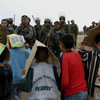
Despite some positive developments this year in the aftermath of the Sharm el Sheikh summit and the withdrawal of Israeli forces from the Gaza Strip, witness testimony pointed to a dire human rights situation in the Occupied Territories, said the Chairman of the Special Committee to Investigate Israeli Practices Affecting the Human Rights of the Palestinian People and Other Arabs of the Occupied Territories, as the General Assembly’s Fourth Committee met this morning to begin its consideration of the Special Committee’s report. After 37 years of denying access for the Special Committee to the Occupied Territories, Israel should revisit the reasons behind such a refusal. Read more about Human rights situation of Palestinians still "dire", General Assembly told

Israel’s continued confiscation of lands, destruction of homes, and exploitation of natural resources had remained the leading causes of the socio-economic crisis in the occupied Palestinian territories, a senior United Nations official told the Second Committee today, as it discussed permanent sovereignty of occupied Arab peoples over their natural resources. Introducing the report on that subject, Mervat Tallawy, Executive Secretary of the Economic and Social Commission for Western Asia (ESCWA), stressed that agricultural losses in the occupied territories, especially the uprooting of more than a million olive trees, the demolition of homes and restrictions on the movement of goods and persons had deepened unemployment and poverty. Read more about Land confiscations and exploitation natural resources main causes of crisis in OPT
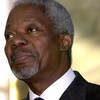
Voicing surprise at Arab League criticism of his Special Coordinator for the Middle East Peace Process, United Nations Secretary-General Kofi Annan today reaffirmed his full confidence in the official, Alvaro de Soto, and said he expected all parties to work with him in the common search for peace. Arab League Secretary-General Amre Moussa issued a statement yesterday criticizing Mr. de Soto for his briefing to the Security Council on 23 September. “There was nothing in that briefing that could be construed as supporting the construction by Israel of the barrier on occupied Palestinian land,” Mr. Annan said in a statement issued by his spokesman. “The position taken by Mr. de Soto was entirely consistent with decisions taken in the General Assembly and the Security Council on this issue,” the statement added. Read more about After Arab League criticism, Annan voices full confidence in Middle East envoy
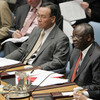
Energetic coordination, cooperation and engagement by Israelis, Palestinians and the international community were needed to translate the disengagement from Gaza into a sustained and negotiated peace, Ibrahim Gambari, Under-Secretary-General for Political Affairs, told the Security Council this morning. “An upsurge in violence has undermined the positive political developments and dulled the sense of optimism that had resulted from last month’s Gaza disengagement”, he said during the monthly briefing to the Council on the situation in the Middle East. “The political track has to be resilient to the inevitable ups and downs of this unstable post-engagement period”, he added. Read more about UN envoy stresses need for coordination to translate Gaza disengagement into peace
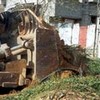
The Special Representative of the Secretary-General on the situation of human rights defenders, Hina Jilani, will undertake a fact-finding mission to Israel and the Occupied Palestinian Territory from 5 to 12 October 2005 at the invitation of the Government of Israel. The Special Representative will assess the situation of human rights defenders, and examine in particular both the legal framework as well as any possible limitations on the right to defend human rights in the country. During the visit, she will meet with Israeli and Palestinian officials, national human rights institutions, non-governmental organizations and individuals engaged in human rights work in Israel and the Occupied Palestinian Territory, as well as United Nations officials. Read more about UN Special Representative on human rights defenders to visit Israel and OPT
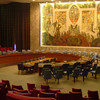
The Security Council today expressed support for the statement issued in New York on 20 September by the Quartet and urged the Government of Israel and the Palestinian Authority to cooperate, along with other parties concerned, with the efforts to achieve the goals set out in that statement. Following a briefing by Alvaro de Soto, United Nations Special Coordinator for the Middle East Peace Process, Council President Lauro Baja (Philippines) read out a presidential statement in which the Council called for renewed action in parallel by the Government of Israel and the Palestinian Authority on their obligations in accordance with the Road Map, to ensure continued progress towards the creation of an independent sovereign, democratic and viable State of Palestine living side by side with Israel in peace and security. Read more about Security Council calls for renewed action by Israel and Palestinian Authority
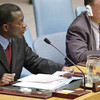
The Chairman of the United Nations panel dealing with Palestinian rights today expressed hope that the positive momentum gained by Israel’s removal of settlements from the Gaza Strip and parts of the northern West Bank would be followed by similar steps in the rest of the West Bank, including East Jerusalem, and “breathe new life into the political process.” The fresh impetus gained by the withdrawal would hopefully lead to a comprehensive, just and lasting solution of the question of Palestine, said Paul Badje (Senegal), Chairman of the Committee on the Exercise of the Inalienable Rights of the Palestinian People, echoing a statement issued yesterday by the Bureau of the Committee on Palestinian Rights at United Nations Headquarters in New York. Read more about Israel’s Gaza pullout must lead to West bank, East Jerusalem exit - UN committee
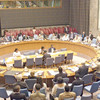
With the first stage of Israel’s “watershed” disengagement from the Gaza Strip nearly completed – although the work for security forces on both sides is far from over – Ibrahim Gambari, Under-Secretary-General for Political Affairs, told the Security Council today during its regularly monthly briefing on the situation in the Middle East. But while Israel’s “bold” first withdrawal is welcome, the situation elsewhere in the occupied Palestinian territory continues to fester, Mr. Gambari warned, with many Palestinians fearing that Israel is consolidating its occupation in the West Bank, including East Jerusalem. “It would be unwise to lose sight of the concern of mainstream Palestinians in both Gaza and the West Bank that their legitimate aspirations may be put off indefinitely.” Read more about With Gaza pullout ending, Israel, Palestinians must remain true to Road Map, says UN
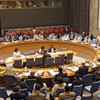
While it is essential for both Israel and the Palestinians not to lose sight of the immediate goal – Israel’s disengagement from Gaza – relations between the two sides are being marred because no agreed framework exists for that pull-out, or for what will happen next, UN Special Coordinator for the Middle East Peace Process, Alvaro de Soto told the Security Council today. “The unease, suspicion and cynicism that bedevil Israeli-Palestinian relations can be attributed in large part to the fact that the disengagement is not taking place within an unequivocally agreed framework for the next steps toward the overall solution to which both sides claim adherence, i.e., two states living alongside each other in peace,” he said in the monthly briefing – his first – on the situation. Read more about Israeli-Palestinian relations bedevilled by lack of framework – UN envoy (3/3)
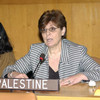
While it is essential for both Israel and the Palestinians not to lose sight of the immediate goal – Israel’s disengagement from Gaza – relations between the two sides are being marred because no agreed framework exists for that pull-out, or for what will happen next, UN Special Coordinator for the Middle East Peace Process, Alvaro de Soto told the Security Council today. “The unease, suspicion and cynicism that bedevil Israeli-Palestinian relations can be attributed in large part to the fact that the disengagement is not taking place within an unequivocally agreed framework for the next steps toward the overall solution to which both sides claim adherence, i.e., two states living alongside each other in peace,” he said in the monthly briefing – his first – on the situation. Read more about Israeli-Palestinian relations bedevilled by lack of framework – UN envoy (2/3)










